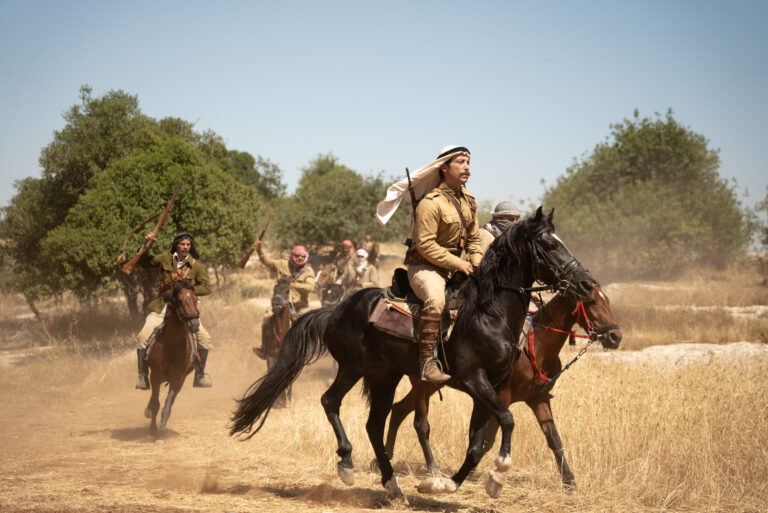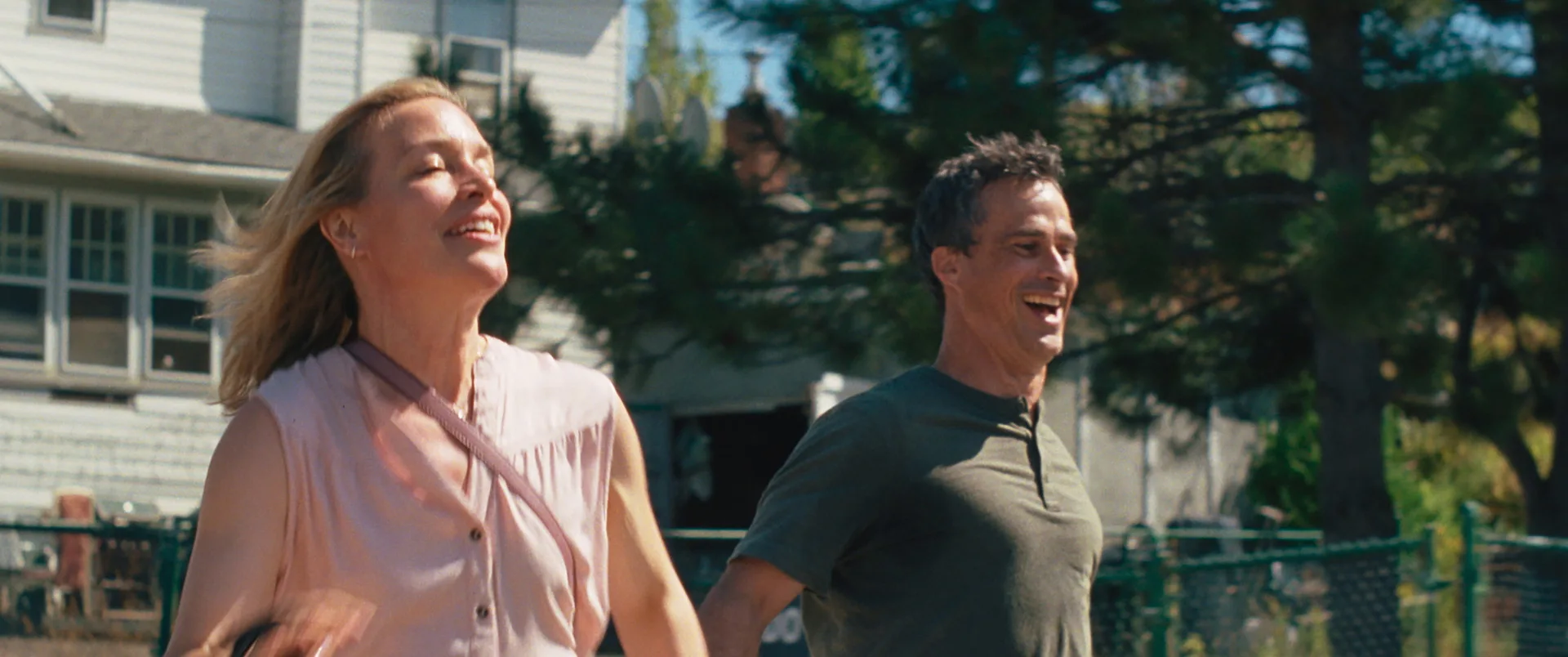
This year at the Toronto International Film Festival, the Gala Presentations included two world premieres: Palestinian filmmaker Annemarie Jacir’s 1930s-set historical epic “Palestine 36” and Nicholas Hytner’s WWII dramedy “The Choral” starring Ralph Fiennes, and the Toronto Premiere for Montreal-based filmmaker Anne Émond’s romantic comedy “Peak Everything,” which first premiered earlier this year at Cannes. All three films seek to examine contemporary society, two through the past, one through the present, with mixed results.
At Sundance earlier this year, Palestinian-American filmmaker Cherien Dabis debuted her generational epic “All That’s Left of You,” which traced three generations of a Palestinian family from the Nakba in 1948 through the First Intifada in 1988, giving a richer context to the current genocide taking place in the occupied Palestinian Territories. Palestinian filmmaker Annemarie Jacir, who has made several feature films and shorts that have explored the rich history and complex lives of the Palestinian people living within Occupied Palestine and the diaspora over the last two decades, has gone even further into the country’s colonized history with her epic “Palestine 36,” which had its world premiere this weekend and is Palestine’s official selection for this year’s Academy Awards. Set in 1936 and 1937, Jacir’s film explores the thorny history of the British Mandate for Palestine, in which diplomats working for the British Empire sought to solve the “Jewish Problem,” aka the rising anti-semitism and expulsion of Jewish people in Europe, by offering those settlers Palestinian land.
While Dabis’ film followed one family over decades, Jacir’s film, which is beautifully lensed by a trio of cinematographers led by the great Hélène Louvart, follows many interconnected characters from all walks of life living in Jerusalem and its surrounding villages as they live through the immense changes that took place in 1936. This includes Yusuf (Karim Daoud Anaya, in raw and tender debut performance), a farmer who also has a job helping out Amir (Dhafer L’Abidine), a bourgeois leader in the city who colludes with the Zionist agenda in hopes of securing his elite status, and his wife Khouloud (Yasmine Al Massri), a radical journalist who writes under a male pseudonym; dock worker Khalid (Saleh Bakri), who soon becomes one of the revolt’s leaders; young villager Afra (Wardi Eilabouni), her mother Rabab (Kamel El Basha), and her grandparents (Hiam Abbass and Kamel El Basha) whose way of life becomes threatened by settlers and the British Army who “protect” them; Father Boulos (Jalal Altawil), a Christian priest, and his son Kareem (Ward Helou) who find themselves targeted by the army just for existing; and a cadre of British diplomats and soldiers, including High Commissioner Wauchope (Jeremy Irons), who says he believes in helping both sides, but only seems to help the settlers, the compassionate Commissioner Thomas (Billy Howle), who advocates for a free and independent Palestinian state and feeds information to Khouloud, Charles Tegart (Liam Cunningham), an anti-insurgents expert who had previously served in India, and Captain Wingate (Robert Aramayo), a Zionist who inflicts unwarranted violence on the villagers and refers to all Palestinians as “animals.” Woven together like traditional Palestinian embroidery to paint a larger portrait, their stories are intertwined with archival footage of ordinary life in Jerusalem at the time, from busy marketplaces, to lush fields, to the picturesque seascapes, which offer a brief glimpse into the country’s vibrant past.
A rich text, Jacir’s screenplay is filled with nuggets of Palestinian history, from the launch of the Palestine Broadcasting Service, the general strike, and the beginning of the farmer-led revolt in 1936 to the Peel Commission, which in 1937 recommended the removal of Palestinians from their land and plan to partition Mandatory Palestine, paving the way for the founding of the State of Israel a decade later. Her script also alludes to earlier historical moments for the country, like the Sykes–Picot Agreement, the women’s movement silent protest of 1929, and even the British occupation of Ireland. Crafted as a Palestinian counter-narrative to something like Otto Preminger’s star-studded 1960 Hollywood epic “Exodus,” Jacir’s film may be brimming with facts and historical allusions that add context to the on-going violence in the region, but its a humanist film at its heart, remaining deeply rooted in the lives of its characters, their relationships with their community, their love for their people, and their enduring connection to their ancestral land.
During his intro to “The Choral,” the latest film from British filmmaker Nicholas Hytner, TIFF CEO Cameron Bailey said the Alan Bennett-scripted film charmed programmers when they saw it and that even though it was set in 1916 the film felt very much “for our times.” Maybe that high bar in the introduction for the film was why I was so disappointed in the final product, which is charming but left no lasting impact on my mind or in my heart.
Set Ramsden, Yorkshire, in 1916, the film centers on a small choral society whose membership has dwindled since the start of the war years earlier. While auditioning new members for their planned performances of Bach’s “St Matthew Passion,” the group’s choir master decides to quit in order to do his patriotic duty and enlist. This leaves the society’s leaders, Alderman Duxbury (Roger Allam), who also owns the local mill where most of the townspeople are employed, and photographer Joe Flytton (Mark Addy), seek out the disgraced Dr. Henry Gutherie (Ralph Fiennes), a closeted gay man (it was illegal to be gay in the U.K. until 1967) who spent the years before the war conducting music in Germany. Once onboard, Gutherie recruits teenage boys and other townsfolk from all walks of life to join them as they mount an adaptation of Edward Elgar’s “The Dream of Gerontius.”
The film seeks to show the power of music and community, but everything is surface level. We see the choral members singing around town, but we never see how it changes them internally. At one point when the leaders object to riff-raff joining the choral, Gutherie says, “the choral shouldn’t mirror the order of society, it should transcend it.” But the most transcendent thing that happens is the riff-raff are invited to tea at the fancy hotel where Gutherie works, but the civic leaders never seem to actually seek to understand the lives of those on other branches of society. While several romantic entanglements arise, the film is never invested in what community can actually be; instead the characters assembled from all walks of life have the depth of a United Colors of Benetton ad. Worst of all, the script is witty in a self satisfied way that makes you chuckle but is ultimately forgettable. It made me think of the quote from Jane Campion’s “Bright Star” where poet John Keats criticizes the wit of dandies, calling them, “Men who say things that make you start without making you feel.”

Lastly, the festival boasted the Toronto premiere of Québécoise filmmaker Anne Émond’s “Peak Everything (Amour Apocalypse),” which had its world premiere earlier this year during Directors Fortnight at Cannes. The film centers on Adam (Patrick Hivon), a depressed forty-something kennel owner whose anxiety over climate change has zapped all joy from his life. After getting a light therapy lamp, Adam calls the technical support helpline, thinking it was another therapy option, where he connects with the sunny-dispositioned Tina (Piper Perabo). Finding a life raft in meaningful human connection, even if just on the phone, Adam begins to emerge from his anxious fog. When an earthquake hits while the two are chatting on the phone, Adam makes the snap decision to drive to Ontario to check if Tina is okay. The rest of the film follows the few days they spend together, talking more in depth, meeting Adam’s family and friends, and later meeting Tina’s family.
While the film is filled with certain tropes of the rom-com genre, like zany moments of playful peril, sight (and sound) gags, and one particularly intense scene of eros, Émond manages to examine the aspects of modern life that weigh Adam down without ever punching down on him, or taking light of the real pain both modern loneliness and climate change anxiety can wreak on someone’s psyche. A moment of shared pain with Tina’s young daughter resonates deeply as we see how this man-made crisis is not only affecting adults, but making our children feel helpless as well.
In the end, Émond’s film doesn’t offer any insights that haven’t been shared before, but I think we all need to be reminded that what is really important in life is the people we love, the impact we can make on the lives of others, and the communities that we can invest in. We have hit peak everything, the terms scientists use to show how we’re past the point of no return, but like Lars von Trier’s “Melancholia,” Émond’s film says for most of us, all we can do is spend what little time we have left embracing those communities, those loved ones, as we go hurtling into the abyss.
Source link

